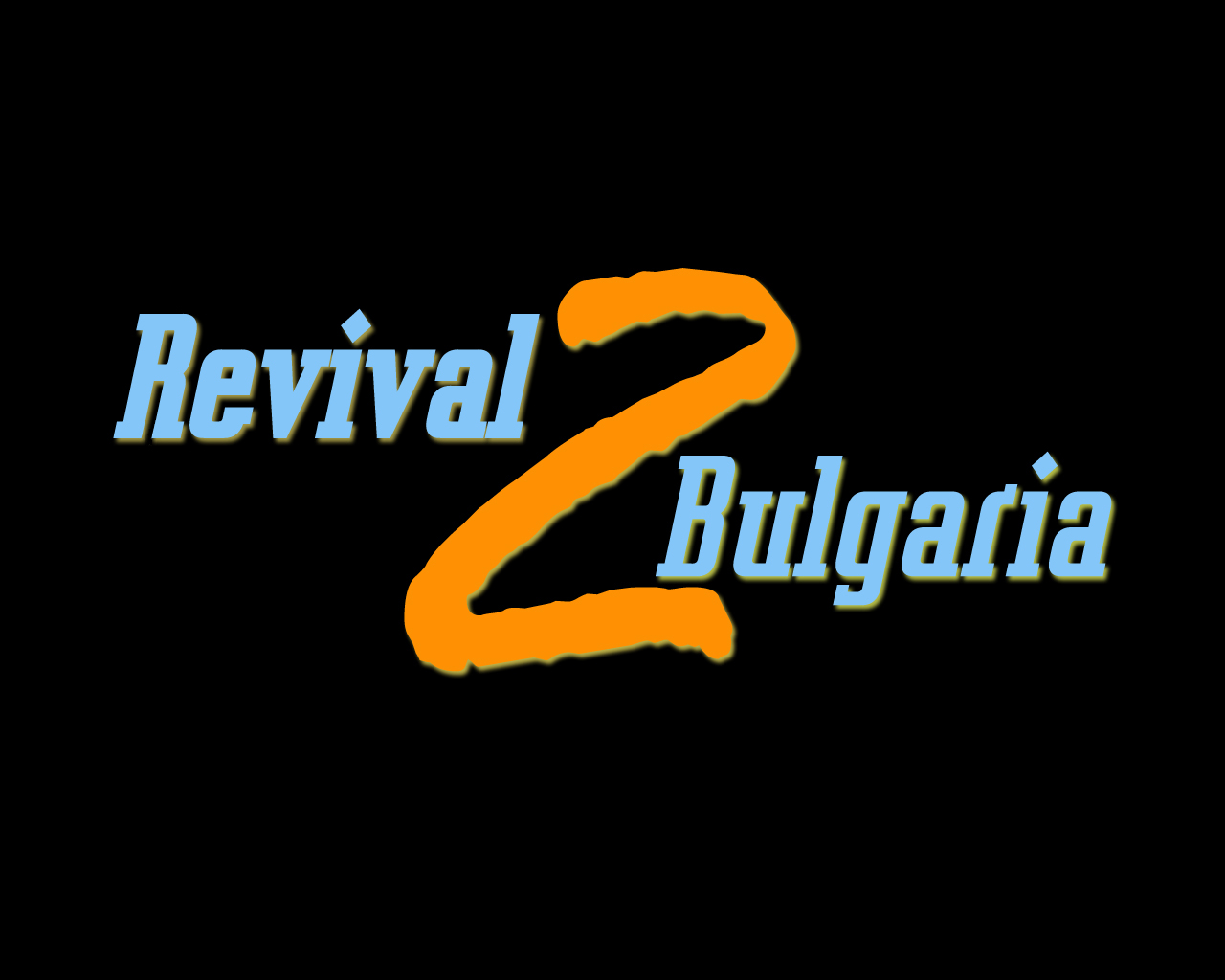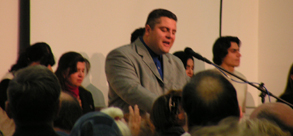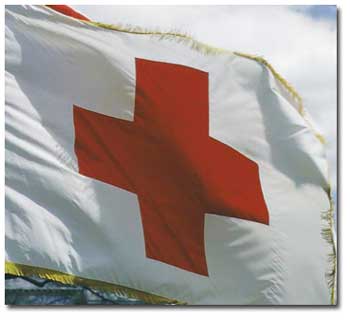Revival Bulgaria 2 Film Released
 Cup & Cross Ministries is proud to announce that it has released its new film, Revival Bulgaria 2. The release of this film has been long awaited for since the release of the first Revival Bulgaria film in 2004. The current release gives report of the ministry of Cup & Cross in Bulgaria in the past three years and provides helpful information about our context of ministry. The film overviews several of our ministry’s efforts such as the Bulgarian Chaplaincy Association, the X Events, revival campaigns and youth rallies, as it concludes with an invitation to the 2008 national camp meeting planned in the Heart of Bulgaria. The film is distributed as a free promotional DVD and can be obtain upon request. Parts of the movie can be viewed at our ministry’s media center at: www.cupandcross.com
Cup & Cross Ministries is proud to announce that it has released its new film, Revival Bulgaria 2. The release of this film has been long awaited for since the release of the first Revival Bulgaria film in 2004. The current release gives report of the ministry of Cup & Cross in Bulgaria in the past three years and provides helpful information about our context of ministry. The film overviews several of our ministry’s efforts such as the Bulgarian Chaplaincy Association, the X Events, revival campaigns and youth rallies, as it concludes with an invitation to the 2008 national camp meeting planned in the Heart of Bulgaria. The film is distributed as a free promotional DVD and can be obtain upon request. Parts of the movie can be viewed at our ministry’s media center at: www.cupandcross.com
Services in Yambol, Bulgaria
I preached one of my first sermons in the Pentecostal church in my home city of Yambol over fifteen years ago. It was followed by many other speaking engagements there, especially at the youth services held every Saturday night at the church.
Many years passed since then and due to extensive travel for ministry and educational purposes, it has been awhile since we have been able to minister at the church. It was this past Sunday that we were fortunate enough to be in service with my home church. Upon the pastor’s invitation we were able to preach at the Communion service as some 400 were in attendance. Many more were also able to respond to the service via the media.
The Pentecostal church in Yambol is one of the first evangelical churches in the country. For many years, before and during the Communist Regime it served as a national center for Bulgarian Pentecostals. Many National Assemblies were held there and important decisions about the development of the Bulgarian Pentecostal Movement have been made in this church.
After the fall of the Berlin Wall in 1989, the Yambol Church again led the Bulgarian Pentecostals in a number of important ministry and public endeavors. The church initiated the first Bulgarian mission work during post communism, the Mission for Christian Upbringing. The first, and so far the only, Bulgarian evangelical political party was founded in Yambol in 1997. This event was followed by the first attempts for a Christian TV production and broadcast in Bulgaria. The city has produced many prominent evangelical ministers. But for me personally, the return to Yambol was much more sentimental. The Yambol Pentecostal Church was the placed where the Lord saved my soul and where for the first time in my life I felt free at last.
Revival in Bulgaria Again
 Spiritual revival began in Bulgaria after the Fall of the Berlin Wall in 1989. God gave freedom to the Bulgarian people and millions heard the Good News. Yet, unfortunately while revival was long anticipated and prayed for, it was hardly expected at the rate which it appeared. As a result of the church’s lack of preparedness, many congregations experienced sudden splits. Years have past as none of them have managed to launch a successful healing process for its congregations. So far, none of the churches which have experienced splits have reunited. However, in the beginning of the 21st century, God is starting something new in Bulgaria and we are here to report that Bulgaria is in revival again. Today, God is calling His people to gather in unity. This is not a humanly organized activity, but rather a divinely inspired ministry purposing complete unity within the Body of Christ. The Holy Spirit is moving again and thousands of people are being touched by the power of God like never before. This time, however, revival comes in Bulgaria through unity and spiritual inner healing for the broken hearted men, women and children of God. For the LORD of hosts mustereth the host of the battle (Isaiah 13:4).
Spiritual revival began in Bulgaria after the Fall of the Berlin Wall in 1989. God gave freedom to the Bulgarian people and millions heard the Good News. Yet, unfortunately while revival was long anticipated and prayed for, it was hardly expected at the rate which it appeared. As a result of the church’s lack of preparedness, many congregations experienced sudden splits. Years have past as none of them have managed to launch a successful healing process for its congregations. So far, none of the churches which have experienced splits have reunited. However, in the beginning of the 21st century, God is starting something new in Bulgaria and we are here to report that Bulgaria is in revival again. Today, God is calling His people to gather in unity. This is not a humanly organized activity, but rather a divinely inspired ministry purposing complete unity within the Body of Christ. The Holy Spirit is moving again and thousands of people are being touched by the power of God like never before. This time, however, revival comes in Bulgaria through unity and spiritual inner healing for the broken hearted men, women and children of God. For the LORD of hosts mustereth the host of the battle (Isaiah 13:4).
Is There Revival in Bulgaria?
This question has been asked time and time again in the past 15 years since the fall of the Berlin wall. However, revival in Bulgaria is not a post-communist element alone. Regardless of the severe persecution of the Communist Regime, the underground church was in a state of nationwide revival and unstoppable growth. Through the testimony and the endurance of the saints, thousands were saved and sanctified. In the larger Pentecostal wing of the underground church, almost 100% were baptized in the Holy Spirit. Although the ruling atheism had proclaimed the death of the church and the communist regime had denied its existence, the Protestant church in Bulgaria was very much alive. Read more
Protestant Revival in Bulgaria
 On November 10, 1989, a day after the border between East and West Berlin opened, the Bulgarian Communist leader of over 30 years resigned and change toward democracy began (Lalkov, 62-63). For those of us, who lived in the final days of Communist Bulgaria, the Fall of the Wall was a modern-day miracle. Emerging from severe Communist persecution and surrounded by the Balkan religious wars, the country of Bulgaria suddenly experienced a time of liberation. Before our very eyes, began a national spiritual revival despite a collapsing economy and political insecurity. Read more
On November 10, 1989, a day after the border between East and West Berlin opened, the Bulgarian Communist leader of over 30 years resigned and change toward democracy began (Lalkov, 62-63). For those of us, who lived in the final days of Communist Bulgaria, the Fall of the Wall was a modern-day miracle. Emerging from severe Communist persecution and surrounded by the Balkan religious wars, the country of Bulgaria suddenly experienced a time of liberation. Before our very eyes, began a national spiritual revival despite a collapsing economy and political insecurity. Read more
Chaplaincy in Bulgaria
Since 1995, Cup and Cross Ministries International has worked toward a vision of the establishment of a Bulgarian Chaplaincy Association – an organization that incorporates pastoral care to prisons, military, police and hospitals. Our outreaches have been able to provide pastoral care and social services to the needy in a time of severe economic crises and political tensions. Our presence has been an answer for people in need for both physical and spiritual support. In the beginning of the 21st century, we are witnesses of a miracle as this vision comes into reality. Today, police and military officers participate in services led by the same ministers and pastors who once, during communism, they were ordered to arrest for the preaching of the Gospel.
History of Events
In September of 1944 the Communist revolution took over Bulgaria. All prior Protestant activates were outlawed. Pastors and ministers were imprisoned. Some were brutally executed. Any attempt for ministry in public was equal to a death sentence. The church went underground for 45 years until the Fall of the Berlin Wall in 1989 and a Holy Ghost revival swept through the country. In the summer of 2000 the Bulgarian Church of God organized a chaplaincy seminar in the Military School in Veliko Turnovo. This was done with the partnership of NATO’s head chaplain along with the representative of the Orthodox Church in Bulgaria, the director of the school under the patronage of the vice-president of Bulgaria Mr. Kavaldjiev. More than 250 officers, spiritual leaders and civil representatives participated. The goal of the seminar was to awaken the interest of the community and appeal for changes in the Bulgarian constitution, which would guarantee the freedom of military personnel to access the chaplain’s services and care.
The Bulgarian Chaplaincy Association
In February of 2002 a chaplaincy seminar, organized along with the Church of God Chaplains Commission, was held in the National Palace of Culture in Sofia. More than 60 pastors, chaplains, students and church workers from different denominations attended. These were people actively involved in military, hospital and prison ministries. The seminar was a stepping-stone for the development of the chaplaincy ministry in Bulgaria. It served as a beginning point of the structural development of the department of chaplaincy and caregivers in the Bulgarian Church of God and facilitated to the establishment of the Bulgarian Chaplaincy Association of which Cup & Cross Ministries became a charter member.
HEALTHCARE CHAPLAINCY IN BULGARIA
David Wilkerson in Bulgaria
On April 7, 2005, David Wilkerson arrived in Bulgaria for a nation-wide crusade. The services were held on April 8-10 in the National Palace of Culture to enhance the work of local pastors and ministers. Believers from virtually all evangelical denominations in the country were present. Representatives from various denominations and whole congregations joined together on Sunday morning in auditorium 1 of the National Palace of Culture in Sofia for the largest evangelical service held in Bulgaria in recent years.
How Do We Do Ministry in Bulgaria? (Part 2: Pastoral Teams)
 The foundation of the Pastoral Teams ministry paradigm is the use of ministry teams in the parallel provision of pastoral care for a group of churches located in close proximity. The method has proven useful in situations with shortage of ministers, newly found churches or satellite church model. It is designed to dynamically accommodate the needs of all congregations included in the program and provide for the training of local ministers who can continue the work.
The foundation of the Pastoral Teams ministry paradigm is the use of ministry teams in the parallel provision of pastoral care for a group of churches located in close proximity. The method has proven useful in situations with shortage of ministers, newly found churches or satellite church model. It is designed to dynamically accommodate the needs of all congregations included in the program and provide for the training of local ministers who can continue the work.
Cup & Cross Ministries first implemented the ministry model using pastoral teams in 1995 during the establishment of the Bulgarian Church of God in Chicago. A similar strategy was designed for our outreach team in Bulgaria, Mission Maranatha. The strategy has been in use with the churches in the Yambol region for over eight years.
In the beginning of the process, two separate teams provided pastoral care through 12 services per week to 5-6 local congregations. In less than six months, the work of the pastoral teams brought to existence two brand-new congregations.
Once the number of churches participating in the outreach passed ten, it was time for the implementation of the second phase of the strategy. The number of ministers in the pastoral teams was increased gradually. The newly included members were trained and then assigned to a group of churches. At the same time people within the local congregation were trained to participate in the ministry process.
Today, Cup & Cross Ministries’ teams provide pastoral care to 19 congregations through over 100 services per month. Since in the Bulgarian Church of God tradition, pastors do not receive salary, the model of pastoral teams has given an opportunity to enlarge the outreach of the church beyond the traditional scope into a larger vision for the future.
How Do We Do Ministry in Bulgaria?
 The prime characteristic of our ministry is revival and church planting. Incorporated in a long-term vision, these characteristics demand special attention to preaching, teaching and publishing of the Word as well as ongoing training of ministers.
The prime characteristic of our ministry is revival and church planting. Incorporated in a long-term vision, these characteristics demand special attention to preaching, teaching and publishing of the Word as well as ongoing training of ministers.
In the current Bulgarian reality, however, long-term planning is virtually impossible as the Bulgarian people are immobilized by the economical and socio-political crises and among all their mentality which still resembles the way of thinking enforced by the half-century Communist Regime.
But even in such context, God remains faithful confirming the preached Word with undisputable signs and miracles. It is through this confirmations of the Spirit that we can continue our work in Bulgaria. The end of 2004 was such a miracle. In the month of December extraordinary signs occurred virtually every day in almost every area of our ministry.
Prayer and Fasting
As part of our evangelistic ministry we setup a schedule where each week one of the nineteen churches under our care holds an all-day prayer and fasting meeting. On December 4th our team held an eight-hour prayer meeting in the Liulin church. Many relationships within the churches were reconciled through forgiveness, as the team had fasted for a long time in preparation for the meeting. The following day, the team with 15 members from the Liulin church traveled to the churches in five other village churches where similar meetings took place. The last one, which was in the Kamenetz church, lasted until 10:30 pm. On the next day, the group ministered in the churches of Polyana (morning) and Leyarovo (afternoon).
Church Building
As the church congregations are growing, the need for buildings becomes more demanding. Only a few of our congregations can afford their own building. The majority rent one, and the congregation which are in a beginners phase meet at the home of one of the members. In December our team was able to provide a meeting place for the Leyarovo church. With the help of many of the members, the building was refurbished and is now used by the congregation.
Ministry to Children
Protestant churches in Bulgaria are very closely monitored when working with minors. Often, church building permits are denied when in close proximity to schools and evangelistic work within the schools themselves is always difficult.
For over four years now, our team has been blessed with the opportunity to hold Sunday School lessons for hundreds of children in the Yambol region villages. In December, we established a new connection within the Child Services Agency which will allow us to work with underprivileged children in their custody or under their care.
Revival Among Traditional Pentecostals
Pentecostalism was introduced in Bulgaria in the 1920s establishing a congregation in virtually every Bulgarian town in its almost centennial history. The Pentecostal Revival which has swept Bulgaria in the past 15 years has had a transforming effect on both unbelievers and believers. Our ministry’s work focuses on areas where the Gospel has not been preached before and reaches people who have never been saved. At the end of 2003 and during 2004, however, our team noticed an opportunity to minister among the members of the older Pentecostal congregations. Since then, we have had representatives of these congregations in every regional meeting, training seminar or conference we have organized. We have also been able to incorporate pastors, church choirs and other ministry teams in our work.
Bulgarian Churches in America
In May, 2004 our team participated in the Annual Conference of Bulgarian Churches in North America in Minneapolis. Since then, three pastors and their families have made mission trips to the Yambol region in Bulgaria. The last one was the pastor of the newly established Bulgarian Church in Ontario and his wife who worked with our team in Bulgaria. in December 2004. This has given us opportunity to invite all of them to minister with us in the field where they can familiarize themselves with the work and prayerfully consider future involvement.
It has been our prayer for over ten years now, that the Bulgarian Churches in North America recognize their call for mission to the motherland. We believe that the events which have been taking place recently will become the first steps toward this direction and will encourage and enhance the work of the Church of God in Bulgaria.








